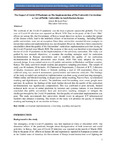| dc.description.abstract | The outbreak of the Covid-19 pandemic was the least expected catastrophe globally. The first case of Covid-19 infection was reported on March 2020. Due to the panic of the Covid-19its’ effects on human life, the Government of Kenya issued directives on how to combat the spread of the disease which, lead to the indefinite closure of institutions of learning . Including Public public universities. were not an exception. Since then, universities mounted diverse strategies to ensure that curriculum implementation was not disrupted. However, there have been concerns by stakeholders about the quality of the Universities’ curriculum implementation activities during of the Covid-19 period since March 2020. The purpose of this study was therefore to investigate the impact of covid-19 pandemic on the implementation of the university curriculum. This study was guided by two research objectives; to examine the teaching strategies used for curriculum implementation in Kenyan universities and to establish the quality of the curriculum implementation in Kenyan universities since March, 2020. This study adopted the survey research design. It was carried out in two (2) public universities in Machakos and Kitui counties, Kenya. The study used both simple random and purposive sampling procedures. The sample of study was 80 students, 20 lecturers, 10 Chairmen of Departments, 2 directors of ICT, 2 directors of Quality Assurance and 6 Deans of Schools yielding a total of 120 respondents. Data was collected using two research instruments; questionnaires and interview schedules. The findings of the study revealed that curriculum implementation was done using several teaching strategies; Online online and blended teaching strategies (pure online teaching, Face to Face, synchronized teaching and digitalization of units). The platforms used for teaching were zoom, google meet and knet. In addition, the findings of the study further showed that the quality of the curriculum implementation was significantly compromised. This was attributed to poor network, limited technical skills on use of online platforms by lecturers and systemic failures. It was therefore concluded that public universities have put innovative teaching strategies to mitigate the challenges brought by the Covid-19 pandemic, but the quality of curriculum implementation was poor. The study recommends that universities should invest in adequate ICT infrastructural facilities that enhance e-learning. The results of the study will promote the quality of blended teaching and learning in all universities in Kenya | en_US |

